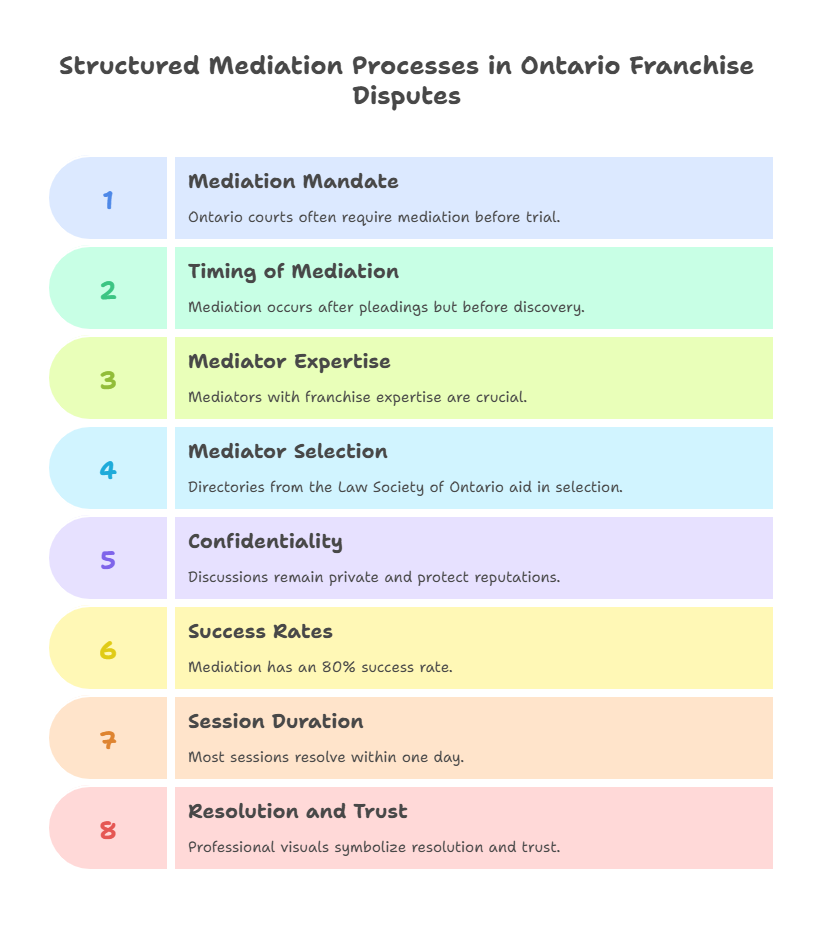Consider this scenario: You’ve invested your life savings into a franchise opportunity in Toronto. Six months later, your franchisor changes territory rules without notice. Your profits drop significantly, and you’re wondering what legal options exist.
Franchise disputes occur more frequently than many business owners realize. Whether you operate as a franchisor or franchisee, understanding Ontario’s dispute resolution processes can save time, money, and unnecessary stress.
Ontario’s franchise law provides specific protections through provincial legislation. This framework gives both parties clear rights and obligations. Learning these rules helps navigate conflicts before they become expensive legal battles.
The province’s legal system offers multiple resolution pathways. Each method has distinct advantages depending on your specific circumstances. Some situations require immediate court intervention, while others benefit from collaborative approaches.
Key Takeaways
- Ontario’s specific franchise laws and how they protect your rights
- Step-by-step processes for different dispute resolution methods
- Strategic factors to consider when choosing your approach
- Essential documentation needed to build a strong case
- When to seek professional legal assistance for optimal outcomes
Understanding Franchise Disputes in Ontario
Franchise dispute resolution Ontario processes address various types of conflicts between business partners. These disagreements can arise at any stage of the franchise relationship, from initial negotiations through post-termination issues.
Common franchise conflicts include:
- Disclosure violations when franchisors fail to provide required information during sales processes
- Territorial disputes involve location rights, market areas, and exclusivity provisions
- Operational conflicts focus on brand standards, supplier requirements, and daily procedures
- Termination disputes prove most complex, involving franchise agreement endings and renewal denials
- Financial disagreements cover fees, royalties, and reporting requirements
The Arthur Wishart Act governs franchise relationships throughout Ontario. This provincial legislation establishes minimum standards for franchise agreements while providing specific remedies when disputes develop.
Provincial jurisdiction covers most franchise matters, though some disputes involve federal issues like competition law. Timing plays a critical role since the Act includes specific time limits for certain claims. Missing deadlines can eliminate available legal options entirely.
Legal Framework: Arthur Wishart Act and Your Rights
The Arthur Wishart Act provides a foundational framework for franchise operations in Ontario. This comprehensive legislation protects both franchisors and franchisees through clearly defined rules and available remedies.
Key provisions of the Arthur Wishart Act:
- Every franchise relationship must operate with honesty and good faith principles
- This duty applies throughout the entire franchise term, affecting daily communications and business decisions
- Franchisors must provide detailed disclosure documents before sales transactions, including audited financial statements and material facts
- The disclosure must be delivered at least 14 days before signing agreements
- Franchisees have explicit rights to form associations and communicate with other system participants
- Franchisors cannot restrict this right or retaliate against franchisees who associate
- Arthur Wishart Act disputes provide rescission remedies allowing franchisees to cancel agreements and recover investments when violations occur
- Available remedies include complete rescission, monetary damages, injunctive relief, and punitive damages in serious cases
- The Act allows legal cost recovery in successful claims
Resolution Options: From Negotiation to Court
Franchise mediation Ontario services offer structured approaches to dispute resolution. Ontario’s legal system provides multiple pathways for resolving franchise conflicts, each with distinct advantages depending on specific circumstances.
Available resolution methods:
- Direct negotiation: Often provides fastest and most cost-effective resolution
- Both parties discuss disputed issues privately without formal proceedings or third-party intervention
- Early settlement offers lower costs, faster timelines, and preserved business relationships
- Effective negotiation requires thorough preparation and strategic thinking
- Mediation: Provides formal negotiation structure with neutral third-party assistance
- Many Toronto-area courts require mediation before trial proceedings
- Mediators with franchise experience understand industry dynamics and effective resolution strategies
- Mediation typically costs between $2,000 and $5,000 per day
- Franchise arbitration process: Provides private dispute resolution with legally binding decisions
- Many franchise agreements include mandatory arbitration clauses
- Arbitration offers private hearings, faster timelines, and industry-experienced arbitrators
- Total costs typically range from $15,000 to $50,000 per party for standard disputes
Direct Negotiation and Settlement Approaches
Direct negotiation represents the most immediate resolution pathway available to disputing parties. This approach allows franchisors and franchisees to address conflicts privately without involving courts, mediators, or arbitrators.
Benefits of direct negotiation:
- Settlement negotiations offer significant cost advantages over formal proceedings
- Legal fees remain minimal when parties can reach agreements quickly
- Business operations continue normally without disruption from lengthy legal processes
- Preserved relationships often strengthen through successful problem-solving collaboration
Keys to effective negotiation:
- Parties should gather relevant documents, understand legal positions, and identify acceptable outcome ranges
- Early legal consultation helps establish negotiating strength and avoid costly mistakes
- Franchisee rights protection improves through well-structured settlement agreements
- Creative solutions can address underlying business concerns while avoiding expensive formal proceedings
- Settlement documents should include comprehensive releases and clear performance obligations to prevent future disputes
Structured Mediation Processes

Mediation provides formal structure for collaborative dispute resolution. A neutral mediator facilitates discussions between parties while helping identify potential solutions and compromise positions.
Key aspects of mediation:
- Ontario courts frequently mandate mediation before trial proceedings can continue
- This requirement recognizes mediation’s effectiveness in resolving commercial disputes efficiently
- Court-ordered mediation typically occurs after initial pleadings but before expensive discovery procedures begin
- Selecting qualified mediators proves critical for successful outcomes
- Choose professionals with substantial franchise industry experience who understand common dispute patterns and effective resolution strategies
- The Law Society of Ontario maintains comprehensive mediator directories with specialty classifications
- Mediation discussions remain completely private and confidential
- This protection preserves franchise system reputation while maintaining ongoing business relationships where possible
- Success rates approach 80% for franchise disputes, with most sessions completing within one day
Formal Arbitration Procedures
Arbitration provides private dispute resolution with legally binding decisions from qualified arbitrators. Many franchise agreements include mandatory arbitration clauses requiring this resolution method instead of court litigation.
Arbitration features:
- Institutional arbitration uses established rules from organizations like ADR Chambers
- These provide structured procedures, qualified arbitrator panels, and administrative support services throughout the process
- Private arbitration allows parties to design customized procedures for their specific needs
- Arbitration offers several advantages over court proceedings
- Private hearings protect confidential business information from public disclosure
- Faster resolution timelines avoid lengthy court scheduling delays
- Industry-experienced arbitrators understand franchise issues better than generalist judges assigned to commercial cases
- Franchise contract enforcement works effectively through arbitration procedures
- Arbitrators can order specific performance, damage awards, and injunctive relief similar to court remedies
- Appeal options remain very limited, providing finality for business relationships
Litigation: When Court Action Becomes Necessary
Franchise litigation Ontario proceedings provide comprehensive legal remedies when alternative resolution methods fail. Court action becomes necessary for complex disputes requiring immediate intervention or precedent-setting decisions.
Litigation process overview:
- The Ontario Superior Court of Justice handles most franchise disputes through specialized Commercial List procedures in Toronto
- Filing requirements include detailed statements of claim, comprehensive defenses, and supporting documentation following strict court rules
- Litigation includes extensive discovery procedures requiring document disclosure and sworn testimony
- Both parties must produce relevant business records and participate in examinations for discovery
- This process often reveals crucial facts and creates settlement opportunities
- Good faith franchise disputes sometimes involve multiple franchisees with similar claims
- Class action procedures allow groups to pursue collective legal action efficiently
- The Arthur Wishart Act protects franchisee rights to participate in class actions
- Courts can order immediate injunctive relief to prevent ongoing harm
- Emergency motions obtain temporary relief within days of filing when delays would cause irreparable damage
- Successful litigation provides powerful enforcement tools including asset seizure and contempt proceedings
Ontario Superior Court Procedures
The Ontario Superior Court of Justice provides the primary forum for complex franchise dispute resolution. Commercial List procedures in Toronto offer specialized judges and expedited scheduling for business cases requiring expert legal analysis.
Court procedure details:
- Initial pleadings establish each party’s legal position through detailed statements of claim and comprehensive defense documents
- These filings must include specific allegations, legal theories, and requested remedies following precise court formatting requirements
- Case management conferences help streamline proceedings by establishing realistic timelines and identifying key disputed issues
- Judges work directly with parties to plan discovery procedures and schedule major hearings efficiently
- Document production requires disclosing all relevant business records, communications, and financial information
- Privilege claims can protect certain attorney-client communications, but most business documents must be provided to opposing parties during discovery
Strategic Considerations for Dispute Resolution
Choosing optimal resolution approaches requires careful analysis of multiple factors affecting outcomes. Each dispute presents unique circumstances that may favor different resolution methods based on specific business needs and legal positions.
Strategic factors to consider:
- Cost-benefit analysis must include legal fees, time investment, business disruption, and opportunity costs
- Quick resolution through negotiation might save money even when compromise outcomes seem less favorable initially
- Litigation provides comprehensive remedies but involves substantial costs and significant risks
- Timeline considerations vary dramatically between approaches
- Direct negotiation takes days to weeks
- Mediation requires weeks to months
- Arbitration spans months to one year
- Litigation extends one to three years
- Urgent situations may necessitate emergency court action despite higher costs
- Confidentiality versus precedent-setting represents another crucial factor
- Private resolution protects business reputation while public litigation creates precedents that might help future cases
- Alternative dispute resolution franchise options work well when evidence supports reasonable settlement ranges
- Evidence strength assessment determines appropriate strategy selection
- Strong documentation supports aggressive litigation positions while weak evidence favors settlement negotiations and compromise solutions that limit potential losses
Evidence Preparation and Documentation
Thorough evidence preparation forms the foundation of successful franchise dispute resolution. Proper documentation protects interests regardless of chosen resolution method while strengthening negotiating positions throughout the process.
Essential documentation:
- The Franchise Disclosure Document provides legal framework governing business relationships
- This comprehensive document includes audited financial statements, detailed franchise agreements, and material fact disclosures
- Review disclosure timing for Arthur Wishart Act compliance and analyze accuracy by comparing representations to actual performance
- Franchise agreements contain specific terms governing daily business relationships
- Pay attention to dispute resolution clauses, territorial rights provisions, and operational requirements
- Communication documentation through emails, letters, and meeting notes provides crucial evidence of good faith conduct
- Financial records including bank statements, accounting records, and tax returns establish business performance and demonstrate claimed damages
- Operational documentation through training records and inspection reports shows compliance with franchise system requirements
- Professional expert witnesses may be necessary for complex financial calculations and industry standard interpretations
- Franchise legal remedies require comprehensive evidence organization and authentication procedures to ensure admissibility in formal proceedings
Why Choose Our Franchise Dispute Resolution Services? Your Success, Our Guarantee
Our extensive experience in franchise dispute resolution provides distinct advantages for your case. We have successfully handled disputes across Ontario’s 80+ franchise locations that we’ve helped establish, giving us deep insight into common patterns and effective resolution strategies.
Our service advantages:
- Our flat-fee pricing structure eliminates surprise legal bills that plague traditional hourly billing arrangements
- You’ll know legal costs upfront, allowing better business planning throughout the dispute process
- Ontario franchise lawyer services require specific knowledge of provincial legislation and court procedures that we maintain through continuous education
- We understand franchise disputes involve ongoing business relationships and operational considerations
- Our approach balances aggressive legal advocacy with practical business solutions protecting long-term interests
- Our Toronto location provides convenient access to court proceedings and arbitration facilities
- Client testimonials consistently praise our responsive communication, detailed case preparation, and successful outcomes
- Our 4.9-star rating reflects commitment to client satisfaction and professional excellence while our proven track record includes recoveries exceeding $1 million for franchise clients
Frequently Asked Questions
What legal options are available for resolving franchise disputes in Ontario?
- Ontario offers multiple resolution paths including direct negotiation, structured mediation, binding arbitration, and court litigation
- The Arthur Wishart Act provides specific remedies like rescission rights, damage awards, and injunctive relief
- Your franchise agreement may require certain resolution methods before others become available
Does the Arthur Wishart Act provide specific remedies for disputes?
- Yes, the Arthur Wishart Act establishes clear remedies for franchise disputes in Ontario
- These include rescission rights allowing contract cancellation, monetary damage awards for proven losses, and protection against retaliation
- The Act also provides for legal cost recovery in successful claims and punitive damages in cases involving serious violations
Can mediation or arbitration be used in Ontario franchise conflicts?
- Mediation and arbitration are commonly used in Ontario franchise disputes
- Many franchise agreements require these methods before litigation becomes available
- Ontario courts also mandate mediation in many commercial cases
- Both options provide private, often faster resolution compared to traditional court proceedings
When should a franchisee take a dispute to court in Ontario?
- Court litigation becomes necessary when alternative methods fail to resolve disputes or when immediate injunctive relief is required
- Consider litigation for serious Arthur Wishart Act violations, breach of contract claims, or when setting legal precedent benefits your position
- Emergency situations requiring immediate court orders also warrant direct litigation
How can a lawyer help resolve franchise disputes under Ontario law?
- Experienced franchise lawyers understand Ontario’s specific legal requirements and court procedures
- We help evaluate claim strength, choose appropriate resolution methods, and negotiate favorable settlements
- Legal representation proves crucial for Arthur Wishart Act compliance and protecting your rights throughout the dispute process
Conclusion
Franchise dispute resolution in Ontario requires understanding legal rights and available resolution options. The Arthur Wishart Act provides strong protections for both franchisors and franchisees through comprehensive legislation. Early intervention often prevents minor disagreements from escalating into expensive legal battles.






